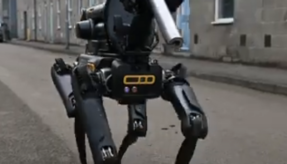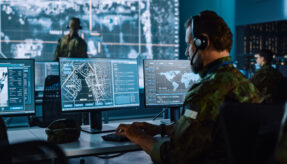
“Jungle is neutral. It attacks everything, and attacks it very effectively. Having kit that works as well in that environment as in the office is priceless.”
Steve Heaword, Trials Director, Crib Gogh
Keeping mission data secure, while equipping soldiers with the timely and accurate intelligence needed to carry out mission-critical actions, is a significant challenge in jungle environments.
Interested parties in the UK recently completed a unique tropical trials project, run in association with the Defence Science and Technology Laboratory (Dstl), as part of a dynamic drill study into effective command and control (C2) operations in the jungle. The objective was to explore how data can be moved around efficiently in the domain, and how information can be safely extracted in the event of an attack or compromise.
Among the equipment and capabilities tested was a hardware-encrypted USB flash drive, provided by Apricorn, which was evaluated as part of a mobile C2 package. The commercially available device combines military-grade FIPS certified encryption with an exceptionally robust build.
During the exercise the drive was stress-tested under extreme conditions, which included being submerged underwater in a somewhat murky mangrove swamp. Due to a layer of hardened epoxy resin which protects the internal components, and its polymer coated keyboard, it survived unscathed, continuing to perform as it should and providing complete return of data.
With no power in the jungle, digital communications is limited. Unique climate conditions lead to signal degradation, and getting line of sight is almost impossible. Physical transfer of information, meanwhile, can put troops in danger: everything that happens in the jungle leaves a footprint, making it easy to track and catch operatives.
“The aim was to find operational kit that provides capability in a zone that is particularly challenging,” explains Steve Heaword, Trials Director at Crib Gogh, suppliers of specialist military solutions. “Communications equipment needs to be able to survive the extreme conditions. If data is lost, then the operation is a failure.”
No purge protocol, no data loss
The Escape and Evade exercise involved a remote communications centre that was ‘compromised’ after being overrun by an opposing force. The USB drive was tested as a solution to the problem of how to contain and transport data if computers are lost or damaged.
Mission data was uploaded to the USB devices twice daily, with the backup taking less than ten minutes. This meant that when the base was ‘compromised’ the team could simply remove the devices and run. Traditionally, the only option would be to delete and purge the data to ensure it could not be exploited, leading to its loss and costing precious minutes.
The data was automatically hardware encrypted on upload, making it impossible to access unless the correct password was entered via the keypad. Hardware encryption provides better protection than software encryption because the keys are protected in a crypto module which prevents brute force attacks and unauthorised access. It also makes the device more portable and easier to manage as there are no drivers or software to install, and delivers better performance since all cryptographic operations take place on the device’s dedicated hardware.
The drives were buried in the bank of a mangrove swamp that was full of algae, and the team headed to an extraction point before returning for the devices 36 hours later.
“We rinsed the drives and let them dry, then plugged them in – and they worked perfectly. All the data was intact,” says Steve Heaword. “One of the covers had been lost, so we didn’t hold out much hope for that device. But we dried it out, and it still functioned exceptionally well.
“The USB drive did everything it was supposed to do, and in the most horrendous circumstances. Usability in the environment exceeded all expectations. There were times during the trial when the rain was coming down, everything was soaking wet, and it continued to work exactly as it was meant to.”
Improved continuity of operation
The trial proved that rugged and hardware-encrypted USB flash drives are a highly reliable and effective solution to sharing information in demanding or volatile environments, supporting fast decision-making and co-ordinated execution of orders.
“The devices enabled full return of data and return of service, while keeping information completely secure and private,” says Steve Heaword. “Even if a USB drive did fall into the wrong hands, if you don’t know what the password is for the keyboard you can’t access what’s on it.” Automatic encryption would also render the information unintelligible to anyone trying to read it.
The use of highly secure, removable flash drives can also increase safety: whereas enemies can scan satellite uplinks to pinpoint location, USB drives and dead drops are ‘off the grid’.
Straightforward to use and small SWaP
The device involved in the trial was Apricorn’s Aegis Secure Key USB 3.0 Flash Drive.
Participants found the USBs simple and intuitive to operate, with a password-protected keypad making it ‘foolproof’, as Steve Heaword puts it. He continues: “Users also valued the phenomenal memory capacity, which far exceeds that of other USB hard drives, providing an unprecedented opportunity for data transfer in delicate situations.”
Other advantages of using removable media devices in a jungle environment include reduced potential for delays and errors caused by software and system failures. Flash drives are also a low-risk, easily deployable solution that can be easily integrated into an existing platform, requiring minimal infrastructure costs and user training. They also have a small SWaP, with size and weight negligible and power provided via an external source.
According to Steve Heaword, the client’s objectives were met and expectations surpassed. As a result, the trial ran for 18 weeks, rather than the six weeks originally planned.
“Apricorn’s USB drive was a key player in making sure data was extracted safely, and was the only device to make it into Round 2,” he says. “It never let us down, it never failed. It’s an amazing piece of kit – in fact, the team are still using it today.”
If you would like to join our community and read more articles like this then please click here.
Apricorn Crib Gogh Defence Science and Technology Laboratory Dstl Steve Heaword







